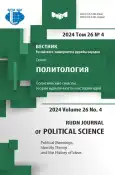The Functional Role of Historical Analogies in Russian and Ukrainian Presidential Discourses on the Special Military Operation
- Authors: Bekliamishev V.O.1
-
Affiliations:
- State Academic University for the Humanities
- Issue: Vol 26, No 4 (2024): Political Meanings, Identity Theory and the History of Ideas
- Pages: 644-657
- Section: THEORY AND PRACTICE
- URL: https://journal-vniispk.ru/2313-1438/article/view/322398
- DOI: https://doi.org/10.22363/2313-1438-2024-26-4-644-657
- EDN: https://elibrary.ru/ZSEGWH
- ID: 322398
Cite item
Full Text
Abstract
The application of historical analogies in Russian and Ukrainian presidential discourses in the initial period of the special military operation (24.02-21.09.2022) is noteworthy. The purpose of the study was to identify their functional role. The results demonstrated that two ontologies of the conflict coexisted in the Russian presidential discourse. The dominant ontology, set by a parallel with the Great Patriotic War, assumed the collective West as an enemy, that uses Ukraine as a “foothold”. The second ontology, described through a parallel with the Russian Civil War, gave Ukraine greater subjectivity, assigning the collective West the role of a third party benefiting from the conflict. In turn, the repertoire of historical analogies in the Ukrainian presidential discourse was much broader, but most of the identified parallels were based on precedent situations from foreign history and were used to influence the perception of the Russian-Ukrainian conflict by the countries of the collective West. The noted imbalance was partly since unresolved structural conflicts between Soviet and nationalist narratives prevented Ukrainian elites from effectively using historical arguments in domestic political communication.
About the authors
Vladimir O. Bekliamishev
State Academic University for the Humanities
Author for correspondence.
Email: bekliamishev@yandex.ru
ORCID iD: 0000-0003-0528-8704
PhD in Political Science, Research Fellow of the Department of Scientific and Innovative Management
Moscow, Russian FederationReferences
- Akrivoulis, D.E. (2015). Metaphors Matter: The Ideological Functions of the Kosovo–Holocaust Analogy. Journal of Balkan and Near Eastern Studies, 2, 222–242.
- Baisha, O. (2023). SVO and the closure of discourses: The displacement of alternative meanings and the fixation of hegemonic meanings. Sociodigger, 4, 9(28). Retrieved November 1, 2024, from https://sociodigger.ru/articles/articles-page/svo-i-zakrytie-diskursov-vytesnenie-alternativnykh-smyslov-i-fiksacija-gegemonistskikh-znachenii (In Russian)
- Bekliamishev, V.O. (2021). On the issue of studying historical analogies in political discourse: description of the problem field. Bulletin of the Moscow University. Series 12. Political science, 6, 92–107. (In Russian).
- Bekliamishev, V.O. (2022). Historical analogies in the presidential discourses of Russia, Georgia and France about the five-day war in August 2008. Bulletin of the Tula State University. Humanities, 1, 77–92. (In Russian).
- Berrocal, M. (2019). Constructing threat through quotes and historical analogies in the Czech and the US “Ukraine Discourse”. Journal of Language and Politics, 18(6), 870–892.
- Brändström, A., Bynander, F., & Hart, P. (2004). Governing by looking back: Historical analogies and crisis management. Public administration, 82(1), 191–210.
- Buzan, B., Wæver, O., & de, Wilde, J. (1998). Security: A new framework for analysis. London: Lynne Rienner Publishers.
- Dreyer, N. (2018). Genocide, Holodomor and Holocaust Discourse as Echo of Historical Injury and as Rhetorical Radicalization in the Russian–Ukrainian Conflict of 2013–18. Journal of Genocide Research, 20(4), 545–564.
- Feis, H. (1967). Some notes on historical record-keeping, the role of historians, and the influence of historical memories during the era of the Second World War. In The historian and the diplomat: The role of history and historians in American foreign policy (pp. 91–122). New York: Harper & Row.
- Gaufman, E. (2015). Memory, media, and securitization: Russian media framing of the Ukrainian crisis. Journal of Soviet and Post-Soviet Politics and Society, 1(1), 141–175.
- Kaarbo, J., & Kenealy, D. (2017). Precedents, parliaments, and foreign policy: historical analogy in the House of Commons vote on Syria. West European Politics, 40(1), 70.
- Kalhousová, I., Finkel, E., & Kocián, J. (2024). Historical analogies, traumatic past and responses to the war in Ukraine. International Affairs, 100(6), 2501–2523.
- Klymenko, L. (2020). Understanding the Donbas war in terms of World War II: A metaphor analysis of the armed conflict in Eastern Ukraine. Formerly Global Review of Ethnopolitics, 19(5), 483–500.
- Kurnyshova, Y. (2024). Analogical reasoning: Historical parallels and metaphors in the 2022 war narratives in Ukraine and Russia. Journal of Regional Security, 18, 9–18.
- Labuda, P. (2024). From genocide to colonialism: Memory wars at the United Nations after the 2022 Russian invasion of Ukraine. SSRN. Retrieved November 1, 2024, from: https://ssrn.com/abstract=4929244 http://dx.doi.org/10.2139/ssrn.4929244.
- Makhortykh, M. (2018). #NoKievNazi: Social media, historical memory and securitization in the Ukraine crisis. In Memory and Securitization in Contemporary Europe (pp. 219–247). London, NY: Palgrave Macmillan.
- Makhortykh, M. (2020). Historical memory and securitisation of the Russian intervention in Syria. International Politics, 57, 1063–1081.
- Malinova, O.Yu. (2019). Policy of memory as a sphere of symbolic policy. METHOD: The Moscow Yearbook of papers from Social Science disciplines, 9, 285–312. (In Russian).
- Pehar, D. (2001). Historical rhetoric and diplomacy — an uneasy cohabitation. In J. Kurbalija & H. Slavik (Eds.), Language and Diplomacy (pp. 117–138). Diplo Foundation.
- Rasmussen, M. (2003). The history of a lesson: Versailles, Munich, and the social construction of the past. Review of International Studies, 29(4), 499–519.
- Stuckley, M.E., & Antczak, F.J. (1994). The battle of issues and images: Establishing interpretive dominance. Communication Quarterly, 42(2), 120–132.
- Zerubavel, Y. (2020). Boundaries, bridges, analogies and bubbles: Structuring the past in Israeli mnemonic culture. Journal of Israeli History, 38(1), 5–23.
Supplementary files









